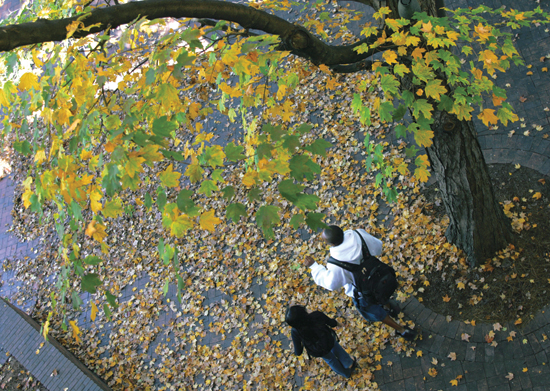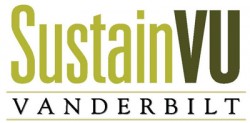The Sustainability Project sparks a campus dialogue about our relationship with the environment and commitment to its future

Bangladesh, in South Asia, is a flat, low-lying land situated between the melting snowcaps of the Himalayas and the rising waters of the Bay of Bengal. As the world warms due to climate change, experts predict the nation – less than 40 feet above sea level in most places – will be engulfed by water by the end of the century.
This problem is the concern of more than just environmentalists. As home to 160 million people, the prospect of a Bangladesh under water has profound social and economic implications for the entire planet.
In the coming academic year, students half a world away on the Vanderbilt campus will tackle the issue in “Water and Social Justice in Bangladesh,” a class being taught by environmental science professors Jonathan Gilligan and Steven Goodbred and political science professor Brooke Ackerly. It’s one of more than 30 courses being offered across the university as part of the American Studies Sustainability Project.
Sustainability – the effort to meet our present needs without compromising the ability of future generations to meet theirs – is “the most pressing question of our time,” said Teresa Goddu, director of the American Studies program and associate professor of English.
“For example, as we move forward, poverty across the globe is largely going to be dependent upon climate,” she explained. “Poor countries will be hit harder. It’s going to create a more unjust, inequitable economic and social landscape. And it’s incumbent upon us to address it.”
With support from the College of Arts and Science Fant Fund, the Sustainability Project aims to start a dialogue on campus about issues of environmental, social and economic sustainability through undergraduate courses, a graduate seminar, acclaimed speakers and a series of “road trips” open to all students and faculty. In collaboration with SustainVU and other academic programs and centers, the initiative will sponsor awareness-raising activities for staff and students and partner with colleagues in art, film studies, creative writing and other areas to provide creative outlets for weaving sustainability into the fabric of the university.
“The Sustainability Project represents a compelling application of the full diversity of Vanderbilt’s academic expertise to one of the most complex and urgent human challenges of our time,” said Carolyn Dever, dean of the College of Arts and Science. “In the year to come and for many years ahead, our shared work on sustainability will change this campus and the world for the better in ways we can’t yet begin to imagine.”
Vanderbilt is already home to centers – including the engineering-based Vanderbilt Institute for Energy and Environment and the law school’s Climate Change Research Network – that contribute scientific and policy-driven research to the sustainability debate. The Sustainability Project will bring this discussion to the curricular level and broaden it to all disciplines.
“[rquote]Because sustainability is such a complex problem, no single discipline can tackle it on its own. It really demands interdisciplinary collaboration and interdisciplinary thinking to begin to untangle it,” Goddu said.[/rquote]
With this in mind, American Studies and the Vanderbilt Center for Teaching convened the first meeting of The Cumberland Project in May. The two-day campus workshop provided interested faculty with the opportunity to design or redesign their courses to include significant environmental and sustainability components.
The workshop drew faculty from engineering, earth and environmental sciences, philosophy, psychology, English, Spanish and Portuguese, sociology, and medicine and global health. Participants heard from a Vanderbilt student who pursued sustainability studies by creating his own interdisciplinary major. They also discussed the possibility of sustainability formally becoming a major or minor course of study at Vanderbilt in the future.
The Cumberland Project, which will meet again in spring 2012, and the academic year-long Sustainability Project are intended to jump-start sustainability awareness on campus with hopes for a long-term and lasting effect.
“The idea is to incubate this in American Studies this year, then see how it might grow – to see where the interest is and who the stake holders are,” Goddu said.
 The Sustainability Project will build on the ongoing work of SustainVU, Vanderbilt’s institutional effort to promote environmental management and sustainability initiatives that improve Vanderbilt’s impact on the environment and the community.
The Sustainability Project will build on the ongoing work of SustainVU, Vanderbilt’s institutional effort to promote environmental management and sustainability initiatives that improve Vanderbilt’s impact on the environment and the community.
“The Sustainability Project will provide our students with a broad understanding of sustainability concepts and how they can serve as a lens for gaining greater clarity on history, economics, ethics and more,” said Andrea George, director of Vanderbilt’s Sustainability and Environmental Management Office. “Dr. Goddu and her team have developed an amazing line-up of events, films and world-renowned speakers that will afford the Vanderbilt community many opportunities to learn about national and international sustainability movements.”
Central to the Sustainability Project’s programming are the dozen guest speakers it will bring to campus, all preeminent experts in the sustainability field. The lecture series kicks off Sept. 22 with Bill McKibben, founder of the international climate campaign 350.org and author of Eaarth and The End of Nature, pioneering books about climate change written for a lay audience.
Beginning in September, SustainVU will sponsor a green bag luncheon series that will address a host of practical topics – from alternative transportation to sustainable food and dining choices to backyard composting. (Take a survey to tell SustainVU what topics you’re interested in.) And April 2012’s Earth Day celebration will feature unique events aimed at reaching the campus in new ways.
Goddu hopes the Sustainability Project achieves a simple, initial goal: that every discipline on campus recognizes its stake in the sustainability conversation.
“I’m an expert in 19th-century American literature, finishing a book on the antislavery movement. When I think about the most important social reform needed in our time, it’s addressing the issue of global climate change,” she said. “Your times demand certain things of you. In our lifetime, the call to action is this.”
On Facebook:
American Studies at Vanderbilt University
SustainVU